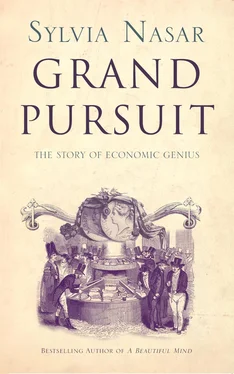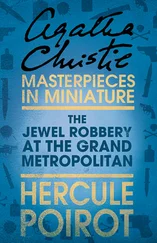Marx and Engels waited impatiently for Armageddon. Like many nineteenth-century romantics, they “saw themselves as living in a general atmosphere of crisis and impending catastrophe” in which anything could happen. 68John of Patmos, the author of the book of Revelation, had supplied them with the perfect finale for modern society and their Manifesto: society splits into two diametrically opposed camps, there is a final battle, Rome falls, the oppressed receive justice, the oppressors are judged, and the end of history comes.
History did not end in 1848. The French revolution of that year led not to Socialism or even universal male suffrage, but to the reign of Napoléon III. The declaration of the French Republic resulted in Marx’s summary ejection from Belgium and, a few weeks after he had found a new bolt-hole in Paris, persecution by the French authorities. When the Paris police threatened to banish him to a swampy, disease-ridden village hundreds of miles from the capital, Marx objected on grounds of health and began to look around for a country that would take him. In August 1849 he moved to London, that “Patmos of foreign fugitives” and home of the former French king Louis Philippe and countless other political exiles. 69It would be for only a short time, he consoled himself.
Marx’s arrival in London coincided with one of the worst cholera epidemics in the city’s history. By the time it had run its course, 14,500 adults and children had died. 70The outbreak encouraged Henry Mayhew, the journalist, to undertake a remarkable series of newspaper stories about London’s poor. 71A scientist manqué who had a terrible relationship with his father, Mayhew was plump, energetic, and engaging, but absolutely hopeless about money. At thirty-seven, the former actor and cofounder of the humor magazine Punch was still recovering from a humiliating bankruptcy that had cost him his London town house and nearly landed him in jail. After months of grinding out pulp fiction with self-mocking titles such as The Good Genius That Turned Everything into Gold, Mayhew saw a chance for a comeback.
Mayhew’s eighty-eight-part series took Chronicle readers on a house-by-house tour in the “very capital of cholera.” 72Jacob’s Island was a particularly noxious corner of Bermondsey on the south side of the Thames immortalized by Dickens in Oliver Twist. Mayhew promised readers a sensational portrait of the district’s inhabitants “according as they will work, they can’t work, and they won’t work.” 73He assured the audience that he was no “Chartist, Protectionist, Socialist, Communist,” which was perfectly true, but a “mere collector of facts.” 74With a team of assistants and a few cabmen more or less on retainer, he plunged into the houses with “crazy wooden galleries . . . with holes from which to look upon the slime beneath; windows, broken and patched, with poles thrust out, on which to dry the linen that is never there; rooms so small, so filthy, so confined, that the air would seem to be too tainted even for the dirt and squalor which they shelter.” 75
Mayhew found that London’s working population was by no means a single monolithic class but a mosaic of distinct and highly specialized groups. 76He ignored the city’s single biggest occupation—150,000 domestic servants—whose numbers demonstrated how large the rich loomed in the city’s economy. Nor did he take an interest in the 80,000 or so construction workers employed in building railroads, bridges, roads, sewers, and so on. Instead Mayhew concentrated on a handful of manufacturing trades. As the historian Gareth Stedman Jones explains, London’s labor market was a marriage of extremes. On the one hand, the city attracted highly skilled artisans who catered to the wealthy and who earned one-fourth to one-third more than in other towns, as much as the clerks and shopkeepers who comprised the “lower” middle class. On the other hand, it thrived on an uninterrupted influx of unskilled labor. Laborers also earned higher wages than their counterparts in the provinces, but their living conditions were apt to be worse because of the overcrowded, decrepit housing in areas like Whitechapel, Stepney, Poplar, Bethnal Green, and Southwark, which had been exhaustively documented by parliamentary commissions of the 1840s. Clerks, salespeople, and other white-collar workers could afford the new omnibuses or trains and were escaping to the fast-growing suburbs. Unskilled workers had no choice but to stay within walking distance of their places of employment.
Competition from provincial towns and other countries was a constant source of pressure to find ways to save on labor costs. The system of “sweating” or piecework, often performed in the worker’s own lodging, was tailor-made to keep industries such as dressmaking, tailoring, and shoe manufacturing that would otherwise have migrated out of London on account of its high rents, overheads, and wages. Thus, Stedman Jones concludes, London’s poverty, with its sweatshops, overcrowding, chronic unemployment, and reliance on charity, was, in fact, a by-product of London’s wealth. The city’s rapid growth led to rising land prices, high overheads, and high wages. High wages attracted more waves of unskilled newcomers but also created constant pressure on employers to find ways to replace more expensive labor with cheap labor.
London’s needlewomen epitomized the phenomenon, and they were the subjects of Mayhew’s most sensational stories. “Never in all history was such a sight seen, or such tales heard,” he promised. 77Using census figures, Mayhew calculated that there were 35,000 needlewomen in London, 21,000 of whom worked in “respectable” dressmaking establishments that ranged from the bespoke to those that catered to the lower middle class. The other 14,000, he wrote, worked in the “dishonorable” or sweated sector. 78Mayhew contended that piecework rates “of the needlewomen generally are so far below subsistence point, that, in order to support life, it is almost a physical necessity that they must either steal, pawn, or prostitute themselves.” 79
On this occasion, Mayhew was more impresario than observer. In November, with the help of a minister, he organized “a meeting of needlewomen forced to take to the streets.” He promised strict privacy of the assembly. Men were barred. Two stenographers took verbatim notes. Under dimmed lights, twenty-five women were given tickets of admission. They mounted the stage and were encouraged to share their sorrows and sufferings. The minister exhorted them to speak freely. To Mayhew’s amazement, they did:
The story which follows is perhaps one of the most tragic and touching romances ever read. I must confess that to myself the mental and bodily agony of the poor Magdalene who related it was quite overpowering. She was a tall, fine-grown girl, with remarkably regular features. She told her tale with her face hidden in her hands, and sobbing so loud that it was with difficulty I could catch her words. As she held her hands before her eyes I could see the tears oozing between her fingers. Indeed I never remember to have witnessed such intense grief. 80
Mayhew’s account in the Morning Chronicle confirmed Thomas Carlyle’s worst fears about modern industrial society, inspiring a choleric rant against economists:
Supply-and-demand, Leave-it-alone, Voluntary Principle, Time will mend it; till British industrial existence seems fast becoming one huge poison-swamp of reeking pestilence physical and moral; a hideous living Golgotha of souls and bodies buried alive; such a Curtius’ gulf, communicating with the Nether Deeps, as the Sun never saw till now. These scenes, which the Morning Chronicle is bringing home to all minds of men, thanks to it for a service such as Newspapers have seldom done—ought to excite unspeakable reflections in every mind. 81
Читать дальше












